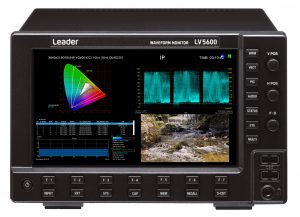Europe’s Cromorama Taps Leader LV5600 Reference Instrumentation
Story Highlights
Cromorama, one of Europe’s most experienced specialists in film and television color management, has chosen Leader LV5600 reference instrumentation for use at its Warsaw headquarters and on location. Cromorama’s founder, Pablo Garcia Soriano, pioneered the implementation of multi-delivery HDR and SDR for large sports events. In recent years he has become a worldwide reference on color control technology for broadcast and digital cinematography productions.
“I have been a keen user of Leader test equipment for six years,” says Garcia Soriano. “Leader ZEN series instruments helped us create the ORION-CONVERT LUT algorithm which we use to support OB coverage of major sporting events. Our role is to ensure precise simultaneous management of HDR and SDR shading in a unified HDR/SDR production workflow.
Leader’s LV5600 is a mains-powered SDI/IP waveform monitor in a half-rack width 3U desktop chassis with an HD resolution 7 inch color touchscreen complemented by dedicated menu control buttons. It can be configured with all the facilities needed to monitor UHD/HD/SD-SDI as well as video-over-IP signals seamlessly in a hybrid operating environment.
Engineering-related features within the LV5600 include test pattern generation, eye pattern display, closed-caption monitoring, CIE color chart, high dynamic range measurement, focus assist, adjustable screen layout, tally interface, 4K/UHD operation, 10G IP input and 12G-SDI interfaces. SMPTE 2022-6, SMPTE 2022-7 and SMPTE 2110 protocols are all supported.
“A crucial advantage of the LV5600 its compactness and versatility,” adds Garcia Soriano. “It accommodates all the tools we need for even the most complex projects, in a robust and easily transportable unit. Everything is accessible quickly from the front panel, including a video monitor that can be configured to allow side-by-side comparison of multiple HDR transfer characteristics as well as SDR.
The LV5600 also incorporates Leader’s intuitive CINEZONE and CINELITE which are familiar to many content production staff.
CINELITE allows video and film creatives to evaluate their lighting and exposure intuitively without needing detailed understanding of video waveforms. A cursor can be used to select any 3 points on a video image and display their f-stop numbers and levels. Operators can choose to analyze a single pixel or a small area by setting the size of the measured area to 1 pixel or to the average value for 9 or 81 pixels.
“Our products are helping the broadcast industry to define the next generation of HDR/SDR workflows, allowing OB producers to delivering more realistic coverage than ever before from major events such as stadium sports,” adds Leader’s European sales engineering manager Kevin Salvidge. “Many streaming services are now using the SMPTE 2084 (PQ) standard to deliver HDR to home viewers, with satellite and terrestrial digital broadcasters increasingly gearing for HLG. HDR and SDR will obviously co-exist for many years to come as the industry advances to the higher standard. We are pleased to be helping specialists such as Cromorama achieve that progression.”
CINEZONE makes it easy to spot overexposure or underexposure by using the color spectrum to represent luminance values on an otherwise normal and recognisable picture. It also reveals variations in luminance levels across dark areas. Luminance levels can be confirmed quickly without need for waveform representations. Levels over the adjustable maximum are displayed in white, highlights in red, mid-grays in green, shadows in blue and levels under the adjustable minimum in black. This helps to confirm that the camera is actually delivering what is expected and, within just a minute or so of familiarisation, becomes more intuitive than the real-world picture.
Options specified by Cromorama include (SER-01) SDI inputs, SER-31 colorimetry imaging zone display and SER-40 extended gamut plug-in hardware modules, plus software licences supporting 12G/6G-SDI, 4K/UHD, CIE chroma chart, closed-caption display, eye and jitter measurement, HDR measurement and test pattern generation.

